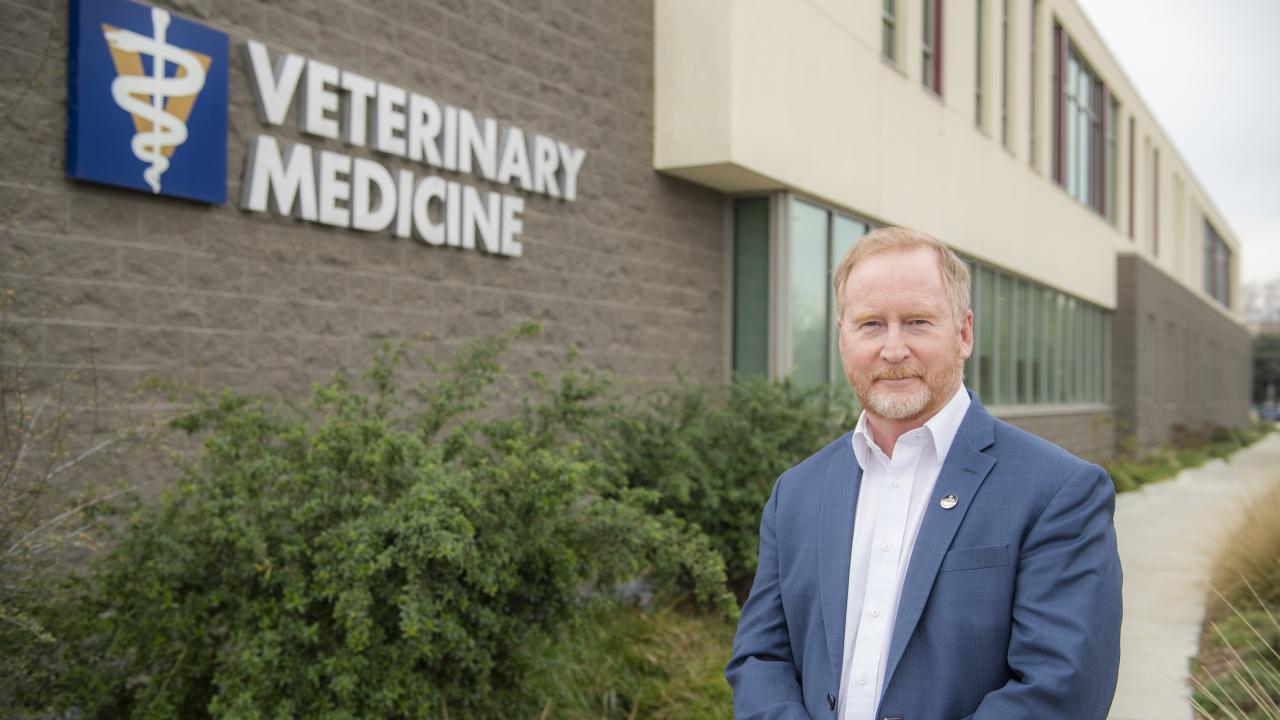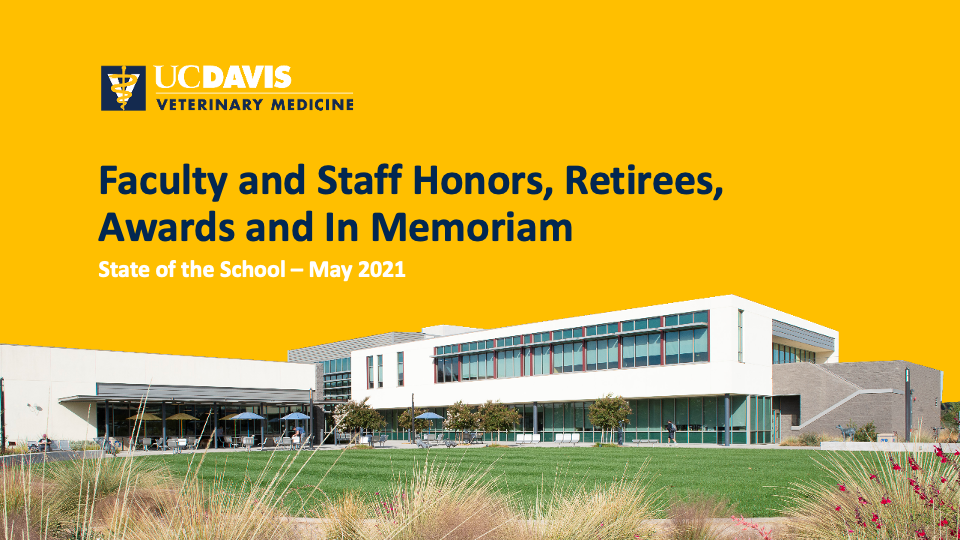
State of the School 2021
In Dean Michael Lairmore’s annual State of the School address on May 20th, he acknowledged the role that each of member of the school’s community plays in its collective mission. It is a “tribute to each who have contributed to the mission, values and aspirations of the school with your knowledge, talent, skills and generosity.”
This was the last State of the School as Dean Lairmore is stepping down in June after a decade of leadership.
As always, the school’s mission remains focused on advancing the health of animals, people and the environment. We’ve been ranked #1 in world in five of the last seven years by QS World University Rankings, and #1 nationally by U.S. News & World Report. That level of excellence can be tied back to our accomplishments in the school’s Strategic Plan goals.
Goal 1 - Educate World Leaders in Academic Veterinary Medicine, Veterinary Medical Practice, Biomedical and Agricultural Research, Industry, Government, and Public and Environmental Health
Due to COVID protocols, counseling appointments shifted to video and phone calls. The Student Programs team interviewed the incoming class of 2025 via new online situational test formats, conducted three virtual career fairs, expanded mental health counseling, and launched weekly mindfulness and meditation sessions.
According to the most recent AVMA report, UC Davis continues to offer the best value in veterinary medical education with the most optimal debt-to-income ratio of all 30 U.S. veterinary schools; has the 2nd lowest median debt of the schools; and is one of two schools with the highest median starting salary of graduates.
Due to pandemic travel restrictions, students supported by Global Programs scholarships conducted much of their research remotely this past year and shifted focus to different projects. Here’s an example from Samantha Pulgini.
Goal 2 - Lead in Innovation and High-Impact Transdisciplinary Research to Advance the Health of Animals, People, and the Environment
“Our researchers adjusted and responded to not only meet the challenges presented by the pandemic,” Lairmore said in his address, “but they excelled—presenting fundamental new knowledge to address societal needs.”
The school once again topped the rankings of all U.S. schools and colleges of veterinary medicine in the amount of funding received by the National Institutes of Health. We reaching the highest-ever level of funding of $36.9M in 2020, an increase of approximately $6M from the previous year.
“This is a testimony to our impact in biomedical research and is important to our nation,” Lairmore said.
The school also led all veterinary schools in total research funding as we have in the past decade, with more than $85.3M. Our faculty produced 880 publications throughout the past academic year.
With this level of federal support, the school was able to expand the Students Training in Research summer program and support more graduate students.
The Veterinary Scientist Training Program – a dual program for DVM/PhD students – celebrated its 20th year of training the next generation of veterinary scientists with a prestigious NIH award. This is the first year that NIH has granted the Medical Scientist Training Program award to veterinary schools.
The Center for Comparative Medicine relaunched as the UC Davis Center for Immunology and Infectious Diseases. They’ve been very active during the pandemic, were involved in 34 NIH grants and hosted two NIH training grant programs. They were also instrumental in the first culturing of SARS-CoV-2, assisting the School of Medicine in developing the diagnostic test needed on campus. They published more than 55 papers in scientific journals.
Other faculty pivoted to SARS-CoV-2 research. For example, Bart Weimer’s lab published a report showing that surges in COVID-19 cases are driven by the appearance of coronavirus variants.
For more updates on research endeavors, please view the presentation recording.
Goal 3 - Provide Cutting-Edge Clinical Programs that Deliver Exceptional Veterinary Services and Support Premier Education, Advanced Specialty Training, and Collaborative Translational Research
The UC Davis veterinary hospital continues to achieve top levels of accreditation from the American Animal Hospital Association. Less than 15% of accredited veterinary hospitals in the U.S. and Canada receive this standard of excellence. Despite the financial setbacks in 2019-2020 due to the pandemic, the hospital is again back on sound financial standing.
“This is a tribute to the strong stewardship of our finances and the innovative approaches to create new revenue streams,” Lairmore said.
While many local veterinary clinics were unable to provide their usual access to care in the early months of the pandemic, the UC Davis Emergency and Critical Care Service remained open. They saw a record number of patients. Our plans to renovate and expand this space as part of the new Veterinary Medical Center will come none too soon.
With the largest house officer program in the nation, the veterinary hospital is able to offer unique opportunities in advanced training. The residents play a vital role in case management under the mentorship of our clinical faculty.
The hospital has continued to pioneer clinical procedures, including the first 3D laparoscopic adrenalectomy in veterinary medicine. The surgery was made possible thanks to the generous financial support of a Mary Kariotis and the UC Davis Center for Companion Animal Health Equipment Fund that allowed the hospital to purchase the 3D laparoscopic equipment.
The Veterinary Center for Clinical Trials, created when Dean Lairmore joined the school, now offers more than 50 clinical trials for a variety of species. These trials are critical to establishing new treatment protocols for our pets. Check out the website for more information.
The school has also received the first National Cancer Institute grant for comparative oncology training. It launched in August 2020 with more than $2M over five years and offers a unique partnership to benefit both human and animal cancer patients. Read more here.
A novel veterinary procedure also helped pave the way for the first FDA-approved clinical trial for spina bifida in humans.
The Veterinary Medical Center is a part of the main campus capital campaign. As a Big Idea, it’s already becoming a reality with the construction of the large animal support facility and the blood donor pastures and corrals. Next up are the All Species Imaging Center, the Equine Performance Center, and the Livestock and Field Services Center.
Goal 4 - Advance the Well-Being of Animals and People in California and Around the Globe
The California Animal Health and Food Safety Laboratory system represents a critical partnership with the California Department of Food and Agriculture. In May of 2020, just after seeing the end of virulent Newcastle disease in poultry, CAHFS saw the first case of Rabbit Hemorrhagic Disease in California. It has now been detected in six southern California counties and continues to spread north.
The Center for Food Animal Health supported 22 research projects in multiple areas including antimicrobial resistance.
New grants from the FDA and USDA have enhanced our ability to protect the food supply and train veterinarians. The Western Center for Food Safety and Security (WIFSS) joined several other state organizations to establish a food safety study, looking at pathogens that may cause foodborne illness.
Our research has contributed to a number of field-based studies such as examining microplastics in Lake Tahoe to studying endangered marine mammals.
A new Wildfire Disaster Network was formed in collaboration with the California Department of Fish and Wildlife to respond and treat wildlife impacted by wildfires.
Goal 5 - Promote a Vibrant and Diverse Community of Faculty, Staff and Students to Advance the Mission of the School in an Engaged and Respectful Community
A new Davis Pet Advocacy and Wellness (PAW) was established as an extension of the Mercer Veterinary Clinic for Pets of the Homeless to provide care more locally. They look to establish monthly clinics and provide hands-on experience with our veterinary students.
The school has also formed a new Community Council to enhance diversity, equity and inclusion. They have prioritized action steps in each of these areas to bolster our goals of promoting a vibrant and diverse community.
We also honor animal owners who partner with us in our mission through the El Blanco Award. In 2020, the award went to Dean and Denise Tracy in recognition of their kindness and deep compassion for animals. They run Tracy Acres Equine Sanctuary and provide a forever home for rescued and special needs horses.
In 2021, El Blanco was awarded to the Wayne and Gladys Valley Foundation in recognition for their transformative support and commitment to the school that has spanned generations.
Staff continue to provide a foundation of excellence and have been recognized over the past year for their dedication to providing the best customer service and contributions to clinical care.
We’ve also transformed the school’s communications and marketing through new publications and outreach. Our research and expertise continue to be sought out around the world, thanks to the reputation building.
Last, but not least, Dean Lairmore acknowledged our donors who help support our mission and support student scholarships. In the past decade, we’ve raised more than $300M through generous gifts.
View the full recorded presentation or download a PDF of the presentation slides .

